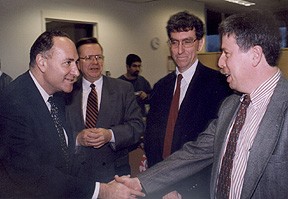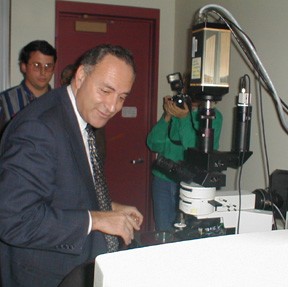Sen. Charles Schumer hears from Cornell researchers about need for federal aid to bring biotechnology to market
By David Brand
New York's junior U.S. senator, Charles E. Schumer, visited Cornell University Monday, Dec. 20, to hear from university researchers and administrators about how the federal government can help improve the process of bringing the fruits of the university's biotechnology research to market.
Schumer spent more than an hour in Cornell's Biotechnology Building, where much of the research at the newly established Nanobiotechnology Center (NBTC) is carried out under the directorship of Harold Craighead, professor of applied and engineering physics. NBTC is one of five new national science-and-technology centers funded this summer by the National Science Foundation.
The senator heard about the problems of marketing new research from NBTC co-director Carl Batt, professor of food science, who has launched a small company, Agave Biosystems, to exploit a Cornell-developed biosensor to detect minute quantities of bacteria in meat. Batt's company has developed a prototype of a hand-held, battery-operated device that can detect certain levels of the deadly pathogen E. coli 0157:H7.
"This has enormous potential," commented Schumer.
The research, said Batt, is an example of "how universities can be economic drivers in areas like central New York." However, he noted, there is "a gap" in the process of taking science and technology from a university and translating it into the private sector. "We need to bridge this gap. It needs an incubator, a place where people can take technology and translate it into the private sector."
Replied Schumer, "Cornell needs incubators. New York needs incubators."
NBTC director Craighead told Schumer that the center's basic research combines interfaces between organic and inorganic materials with industrial interaction and a strong educational component.
"NBTC is just the tip of the iceberg. We are going to see a dramatic expansion across the campus and the state," Craighead said. "I would claim that nobody has as diverse a group of life scientists, engineers and physical scientists getting down to these basics as at Cornell."
Commented Schumer: "This is great. It's the kind of stuff I am very interested in."
This was Schumer's first visit to the Cornell campus since his 1998 election to the Senate. Schumer last visited Cornell as a member of the U.S. House of Representatives from New York representing the congressional district in Brooklyn and Queens, a position he held for nine terms. His first visit to Cornell was as a high school student attending a biology summer school in the mid-1960s.
After a tour of Batt's laboratory, Cornell administrators emphasized to Schumer that the way to help such advanced technology and innovative products to market is to create a funding mechanism that would enable researchers to move quickly, efficiently and smoothly through this process. Cornell is proposing a system whereby researchers working under federal grants could apply for extensions of the federal grant they are currently working under for the purpose of technology development and transfer.
Under this system, granting agencies could include an option in their guidelines that would provide additional funding -- over and above that to support the fundamental research -- to faculty members who want to pursue technology development and transfer resulting from their federally funding research projects. Faculty could apply for the optional funds anytime during the grant period through a simplified proposal process detailing the development process and its anticipated impact on economic development.
Among those who met with Schumer from Cornell were Provost Don Randel; Robert Richardson, vice provost for research; Kraig Adler, vice provost for life sciences; Daryl Lund, dean of the College of Agriculture and Life Sciences; and Henrik N. Dullea, vice president for university relations.
Media Contact
Get Cornell news delivered right to your inbox.
Subscribe
